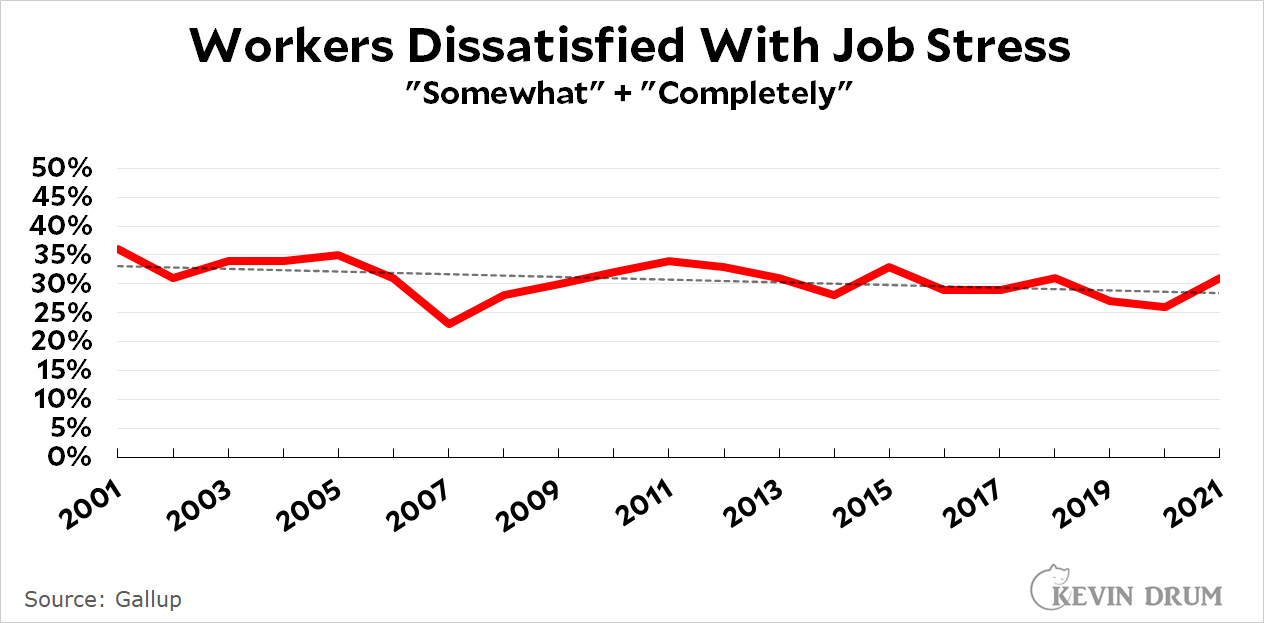The Washington Post gets us up to speed today on the latest meme/vibe/tiktok taking over the business world. It's called "quiet quittting":
Kathy Kacher, founder of Career/Life Alliance Services, said that “quiet quitting” is a new term for an old concept: employee disengagement.
But it’s arriving in a moment of “unprecedented burnout,” Kacher said. It’s coming in on the heels of the “Great Resignation,” which saw an average of nearly 4 million employees leave their jobs each month in 2021 amid clashes over flexibility and a widespread reevaluation of how work should fit into their lives.
And it’s also gaining steam at a moment of peak tension between managers and employees, as many companies prepare for another push to bring workers back to offices.
For some workers, office mandates aren’t just a pain. They’re harmful. “If some one is giving their best in 40 hours and then want to spend rest of time for living isn’t terming/labeling that behavior quiet quitting derogatory?” a HomeAway employee asked earlier this week on Blind, an anonymous corporate messaging board.
Consider what we've been told—and what we haven't:
- Quiet quitting is just a new term for an old idea.
- We are in a moment of unprecedented burnout.
- We are also at a moment of peak tension between workers and managers.
- Workers are reevaluating how work should fit into their lives.
- Quiet quitting means working your 40 hours a week and then going home.
Absolutely no evidence is provided for any of the claims about burnout, tension, or reevaluating work. None. But here's some:
 God knows there was an uptick in general unhappiness during the pandemic. It would be remarkable if there hadn't been. But stress on the job seems to have gone up only a bit, and even at that only to the level it was at for most of the aughts. So where did "quiet quitting" come from?
God knows there was an uptick in general unhappiness during the pandemic. It would be remarkable if there hadn't been. But stress on the job seems to have gone up only a bit, and even at that only to the level it was at for most of the aughts. So where did "quiet quitting" come from?
As near as I can tell from the article, last month a TikTok user named zaidleppelin invented the term in a banal 17-second video that told people there's more to life than work. For some reason this bit of threadbare advice has gotten 3 million views and this is enough for people who should know better to go gaga over the claim that Millennials and Gen Zs are widely unhappy with their work/life balance.
And maybe they are. So were boomers, who made "work/life balance" practically a mantra in the '70s. Gen Xers did the same in the '90s, and now Millennials are doing it. Welcome to the workplace, folks.

Pingback: Column: 'Quiet quitting' is just a new name for an old reality - Technocharger
Pingback: Hiltzik: Nothing is new about 'quiet quitting' but the label - The News Sow
Pingback: Hiltzik: Nothing is new about 'quiet quitting' but the label - Illuminati Press
Pingback: Hiltzik: Nothing is new about 'quiet quitting' but the label - galaxyconcerns
Pingback: Column: 'Quiet quitting' is just a new name for an old reality - News Bit
Pingback: Column: 'Quiet quitting' is just a new name for an old reality - 21IF-The Integrated Finance and Money Channel
Pingback: Hiltzik: Nothing is new about 'quiet quitting' but the label - Current Time News
Pingback: Column: 'Quiet quitting' is just a new name for an old reality - Edinburg Post
Pingback: Quiet quitting is surging on TikTok, the trend is nothing new - Legal Regulation Review
Pingback: Quiet quitting is surging on TikTok, the trend is nothing new - Today Usa Newz
Pingback: Quiet quitting is surging on TikTok, the trend is nothing new - National News USA
Pingback: L'arrêt silencieux déferle sur TikTok, la tendance n'est pas nouvelle - Nouvelles Du Monde
Pingback: Column: 'Quiet quitting' is just a new name for an old reality | West Observer